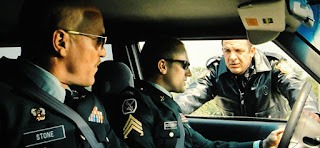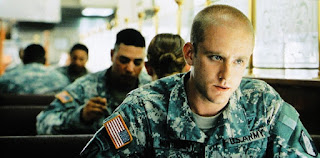-Captain Tony Stone-

Don't shoot the messenger is normally an amusing defensive expression. Here that adage is hardly befitting of Israel-born director Oren Moverman's, less-than-amusing film debut, The Messenger (2009). Even writing about it seems a delicate matter.
The post-war story by Moverman arrived just weeks before director Jim Sheridan's equally stirring psychological examination Brothers (2009) that same year here. The two films could serve as a double bill if one could stomach the difficult material back to back.

Brothers may be the darker film, though not without hope, but both are tough watches. Both films are dramatically exceptional and unique in their narratives sharing little in common other than the salient psychological effects, realities and trauma families suffer following the effects of war. This is not feel good material.
The film centers on a Casualty Notification team played by Woody Harrelson and Ben Foster as messengers Captain Tony Scott and Staff Sergeant Will Montgomery respectively. The two soldiers are tasked with one of the hardest missions a solider faces---informing a family of the loss of a loved one. The reactions to their message are always varied and often unique.

One of the two messengers, Montgomery, takes an interest in a woman, played by the always credible Samantha Morton. This is a messenger desperate for a human connection following his time served in Iraq.
The Messenger, by all accounts, may have its detractors regarding the realism with which it is portrayed, but as a dramatic enterprise it is gripping and offers a window into the world of our American soldiers.

As men in charge of casualty notifications Stone makes efforts to disconnect emotionally from contact with next of kin and stay on or hold to script. Montgomery is not the same man and seeks to make a connection and potentially feel love. Whatever the protocol there is a stubborn thing called human behavior that plays a part in that equation.
The disconnect emotionally is also significant in analyzing its messengers, two men who have buried themselves with all manner of walls and barriers following the scarring of war. The film examines their own walled up emotional disconnect and, in their own way, their efforts to climb back into an emotional connection with home through each other.

It speaks volumes when Montgomery tells Stone they should ask someone for directions.
"No. First of all men don't ask for directions much less soldiers. Soldiers on a notification definitely positively do not ask for freaking directions. No GPS. No mapquest. We navigate." Spoken like a true man.
This dialogue selection speaks volumes about the expectation of soldiers and men to wear a brave face. When Stone explains to Montgomery to remain detached for their mission. No contact. No expression of feeling. It speaks volumes about how far the soldier buries emotion and to some extent their own personal humanity to perform their mission, be professional and to ultimately protect civilians from seeing that which the soldier "cannot unsee."

Soldiers are tasked with visiting families and each meeting results in varied responses and unexpected reactions to such truly devastating news concerning the loss of loved ones. The Messenger, protocols and procedures aside, bears out one truth. Human behavior is entirely unpredictable.
Another truth the film keeps in mind is that the United States Military is a dynamic, complex and multi-cultural entity comprised of a nation of peoples serving one country and one mission.

Each new family, home or residence visited reminded this writer just how different we are as Americans, sometimes wildly so, yet despite these varied, different backgrounds of creed and color men and women serve side by side for one nation, like law enforcement. They work together, live together, dine together, fight shoulder to shoulder and live and die together. These mutual goals bind us and our varied backgrounds bonding us to serve one country. At least that should be the intention. The mission by all as a collective is to protect our individual freedoms and our rights to express ourselves, no matter how deplorable or reprehensible our personal views may see those expressions, and ironically, even how divisive some of those expressions of free will might well be. We protect them through a collection of individuals.
The Messenger should at least remind us of what binds us as a nation and how it should work. The United States Military is also a symbol of our nation as a melting pot and presents a positive depiction of the best of us and how we can be. At present we are terribly divided as a people but the military deserves our support. Today technology and communication have seemingly blinded us to basic forms of human expression that should permit for different views, but often we are satisfied with a simple keyboard-driven quip to deliver the a message of invective. The Messenger reminds us we could all use a bit more conversation in our message.

The Messenger also speaks to the fact your culture, creed, race or sex should have little to do with your loyalty to country. The problem is when these things come before your loyalty to nation and each other.
The Messenger may be a factually imperfect film. I don't know. How much of that is the result of Israel born director Moverman and his Italian-born co-writer is unknown, though so much of it feels right. This sense of authentic presence may resonate from the fact Moverman was an Israeli combat veteran himself. Some of the dialogue is mesmerizing. Some may take considerable issue with the film's portrayal of such a difficult job at least in terms of technique, but it is no less universally wrought with hardship.

Yet for every one who might take issue there are others. The sleeve notes to the film itself share a beautiful tribute to the American soldier and what has been committed to film here. Author Anthony Swofford who penned Jarhead (2003), adapted to film in 2005, was also a US Marine and the veteran penned an essay All The Rules Are Gone for this film speaking to what amounts to the unorthodox and unanticipated nature of each and every casualty notification. As Swofford notes The Messenger represents the inescapable "domestic side of warfare." Swofford wrote, "American men and women are risking their lives each day." Right or wrong, the message is profoundly moving and The Messenger is "a tribute to these service people and a memory marker for the citizens of the country that has asked them to risk so much." What The Messenger effectively does is ask viewers to not forget those that might be forgotten.
The Messenger, like Brothers, is a thoroughly engaging and human picture that addresses head on the fragility of life for soldiers and families in war's wake. The message may not be perfect, but there is much here to take away concerning this aspect of the military life. At the very least, unlike some war films that tackle casualty notifications in a cursory fashion, The Messenger tackles it head on, right or wrong, lensing some disturbingly uncomfortable moments along the way.

The Messenger.
Writer: Alessandro Camon/ Oren Moverman. Director: Oren Moverman.

The War: Iraq (2003-present).

What critics had to say:
Rotten Tomatoes ranked The Messenger at 89% tomato.
Roger Ebert gave the film 3.5 (of 4) stars. "Maybe the only way to do it is by the book. This one looks at the faces of war. Only a few, but they represent so many."
Blu-Ray.com: "2009 ushered in a new focus on the crippling nature of modern warfare, and the scars it can leave on the men and woman that serve their country. The Messenger deserves recognition as one of the greatest films of 2009."
The War Film Blog: Recommended.

Notable dialogue:
"Learn the script. Stick to the script. Can you do that? ... Never say stuff like lost or expired or passed away. Things people misunderstand. I knew this guy who once told this old lady that her grandson was no longer with us. She thought he had defected to the enemy started calling him a traitor. We need to be clear. Need to say killed or died. ... We call each casualty by name. We honor them. You do not speak with anybody other than the next-of-kin. ... You do not touch the N-O-K. Avoid physical contact with the next-of-kin, unless it's a medical emergency, like they're having a heart attack or something. You're representing the Secretary of the Army, not Will Montgomery, so in case you feel like offering a hug or something...don't. ... These are the rules." (Captain Tony Stone)

What drew me to the film:
There was first and foremost an interest in The Messenger's depiction of an aspect of the military often given little coverage. This writer expected some real dramatic power in such a revelation. Some would argue looking at the HBO film Taking Chance (2009), starring Kevin Bacon, a film that was also released early in 2009 offers an important angle and window into this world that The Messenger misses.
It's pretty clear 2009 was a big year for the war genre, a year that included Academy Award Winner The Hurt Locker (2009). In fact, its release may have overshadowed the success of many of these other films worthy of attention.
Nevertheless The Messenger and Brothers were films that tackled the aftermath of war and coming home. There have been other powerful films that have tackled these aspects of the soldier, family and friendship including Hal Ashby's Coming Home (1978), Michael Cimino's The Deer Hunter (1978) and Oliver Stone's Born On The Fourth of July (1989).

The cast of The Messenger had my attention too.
Ben Foster has always impressed me. Hostage (2005), 3:10 To Yuma (2007), Pandorum (2009) and Peter Berg's war film Lone Survivor (2013) have all been uniformly excellent.
But once again, Woody Harrelson owns the screen here following on from an endless string of classics. His performance in HBO's True Detective (2014) will always impress beyond words, but his work as a performer continues to elevate material.
Actress Jena Malone is a bonus and nearly unrecognizable here.

And finally my odd obsession with all things Samantha Morton continues. She completely immersed herself in a credible role here gaining considerable weight for the part since her far more sensual performance in Code 46 (2003) and her memorable turn in Enduring Love (2004) and In America (2003), also directed by Jim Sheridan (Brothers). Here she fits the bill for a rather ordinary military spouse to perfection. Though good, Morton takes a backseat to the two strong male leads here.
The Messenger Blu-Ray was also given a loving digipack presentation that will surely please every genre or film collector.

Any substantive procedural missteps The Messenger may make in delivery is surely more than compensated for by many of the resonating human interest-based reasons already discussed. This is an impeccably performed war drama handling a very delicate area unfortunately experience by far too many American families.
In the end this writer enjoyed, or more appropriately appreciated the film's message. Like Brothers, after war, this is an engagement of a different kind and just as challenging to our humanity. Of course, please, by all means disagree here, because remember, for this blog, I'm but one mere messenger.











No comments:
Post a Comment